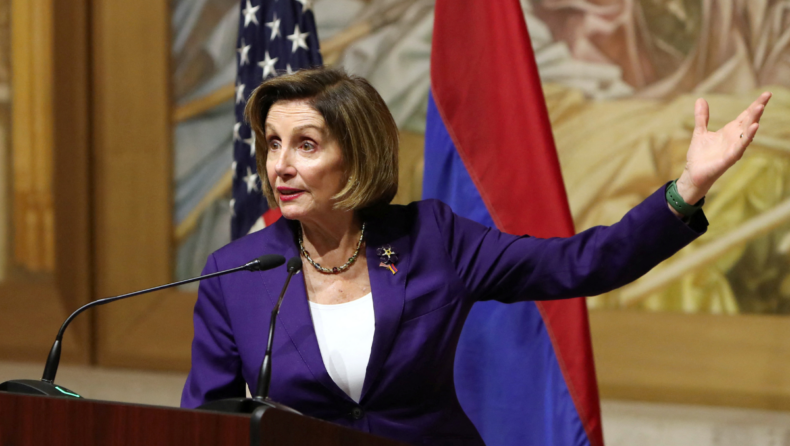Days after deadly clashes broke out at the Armenia-Azerbaijan border, Nancy Pelosi, during a press conference in Yerevan, condemned Azerbaijan over its “illegal and deadly attacks” on Armenia.
On Sunday, Nancy Pelosi spoke with members of the press at the parliament of Armenia, condemning the attacks by Azerbaijan on Armenia as “illegal and deadly”. Further, Pelosi also blamed Azerbaijan for triggering the border clashes by starting the attack.
Pelosi landed in Armenia on Saturday, making her the first high-ranking official from the US to visit the country since it gained independence in 1991 after the collapse of the Soviet Union.
The visit by Pelosi comes at a time when the Armenia-Azerbaijan border witnessed deadly clashes after a truce was called between Armenia and Azerbaijan in 2020.

The speaker of the U.S. House of Representatives blamed Azerbaijan for the latest outbreak of fighting with Armenia, as she made a high-profile trip to Yerevan in a public show of support.
In response, Azerbaijan stated that such remarks were not only “unsubstantiated and unfair” but also a deterrent to peace efforts. Calling the remarks “unacceptable,” the Foreign Minister of Azerbaijan stated that the remarks dealt a serious blow to efforts to normalize ties between Armenia and Azerbaijan.
The last time Armenia and Azerbaijan were engaged in a conflict was back in 2020 when the two sides fought over a mountain region called Nagorno-Karabakh.
This conflict in the region is not a new one and dates back to the Soviet era. In 1994, Armenian forces gained control of the region. However, after the 2020 war, Azerbaijan pushed the Armenian forces out of the region.
While speaking at the press conference, the speaker of the Armenian parliament, Alen Simonian, stated that Armenia expects US backing to protect the “democracy, sovereignty, and territorial integrity” of Armenia from all directions.
He further asserted that the three-day visit by Pelosi plays a major role in ensuring Armenian security.
Armenia-Azerbaijan border clashes
Over 215 casualties were experienced in the recent Armenia-Azerbaijan border clashes.
The last war fought in 2020 over the Nagorno-Karabakh region resulted in over 6,500 casualties before a ceasefire brokered by Russia brought the war to an end. Since then, Russia has tried to keep the fragile truce intact by deploying almost 2,000 Russian peacekeeping forces in the area.

Russia plays a crucial role in the conflict as a military ally of Armenia and has tried to broker a ceasefire in the recent conflict as well.
Russia has taken credit for the recent truce that ended hostilities on Thursday. Russian President Vladimir Putin on Friday talked about the role of Russia in localizing the conflict.
A claim refuted by a US official who ruled out any positive Russian influence in the recent truce.
Nancy Pelosi in Armenia
Before meeting with Armenian Prime Minister Nikol Pashinian, Nancy Pelosi paid her respects at a memorial at a Yerevan hilltop monument honoring Armenians who lost their lives during World War I as a result of an Ottoman Turk campaign.
The visit to the monument was significant as the killings had been formally declared to be genocide by US President Joe Biden in April 2021.
Pelosi’s visit to Armenia comes in the midst of other high-profile trips she has made recently.
She met with Ukrainian President Volodymyr Zelenskyy in Kyiv, Ukraine in May during the ongoing war between Ukraine and Russia.
In August, Pelosi visited Taiwan amidst strong criticism by China over the visit. China lays claim to the independent island nation under the “One-China” policy. Pelosi’s recent visit to Taiwan has increased tensions between the US and China.
Before leaving for Armenia, Pelosi tweeted about the significance of her visit, saying that it demonstrated the US’s strong commitment to security, economic growth, and democratic governance in Armenia and the Caucasus.
The ongoing trip of Nancy Pelosi to Armenia following the Armenia-Azerbaijan border clashes signifies the importance of the region, which has the involvement of Russia, the EU, and the US.













